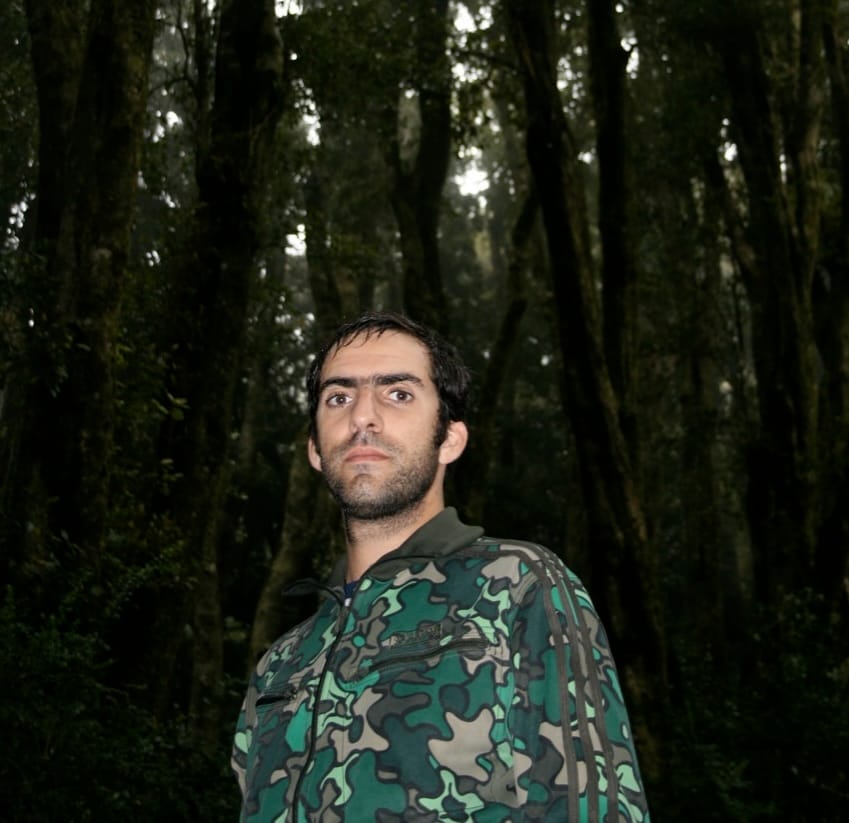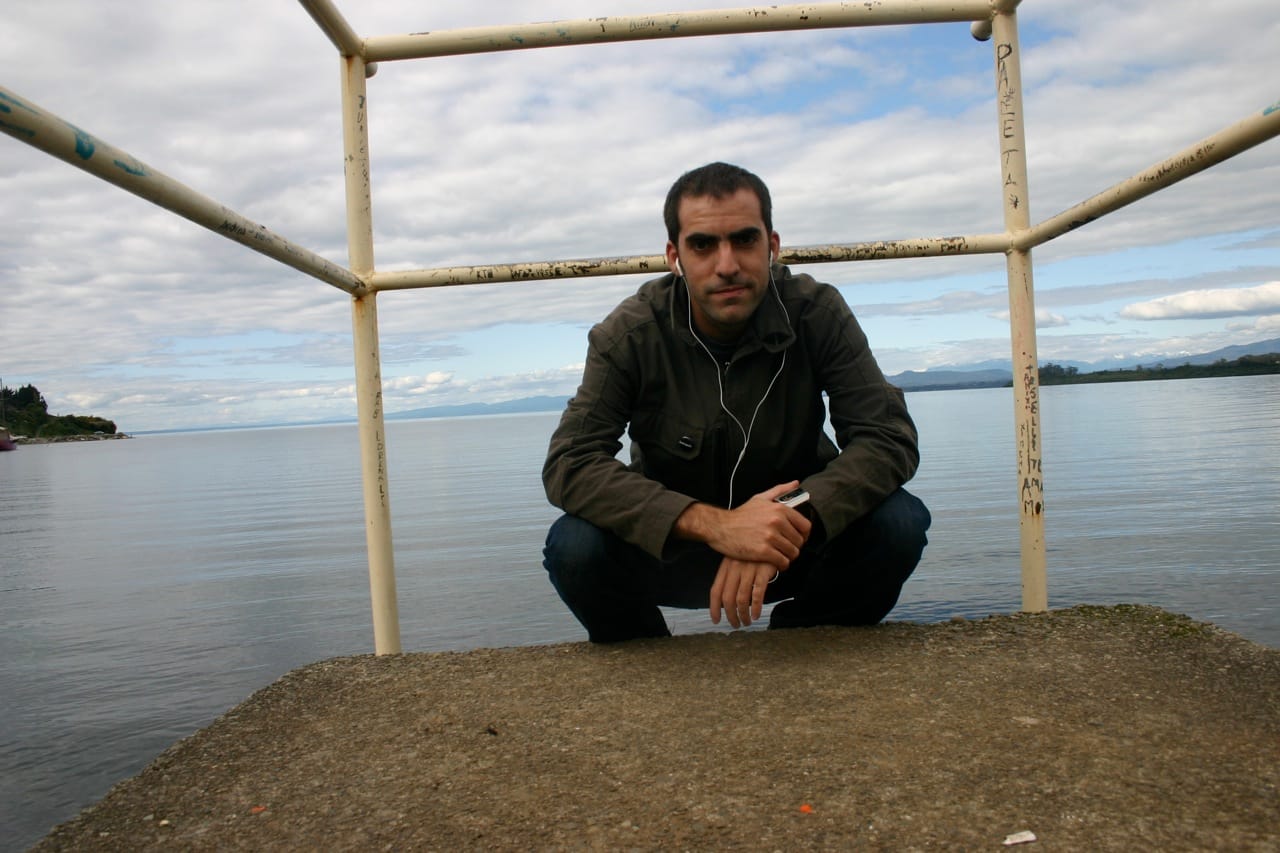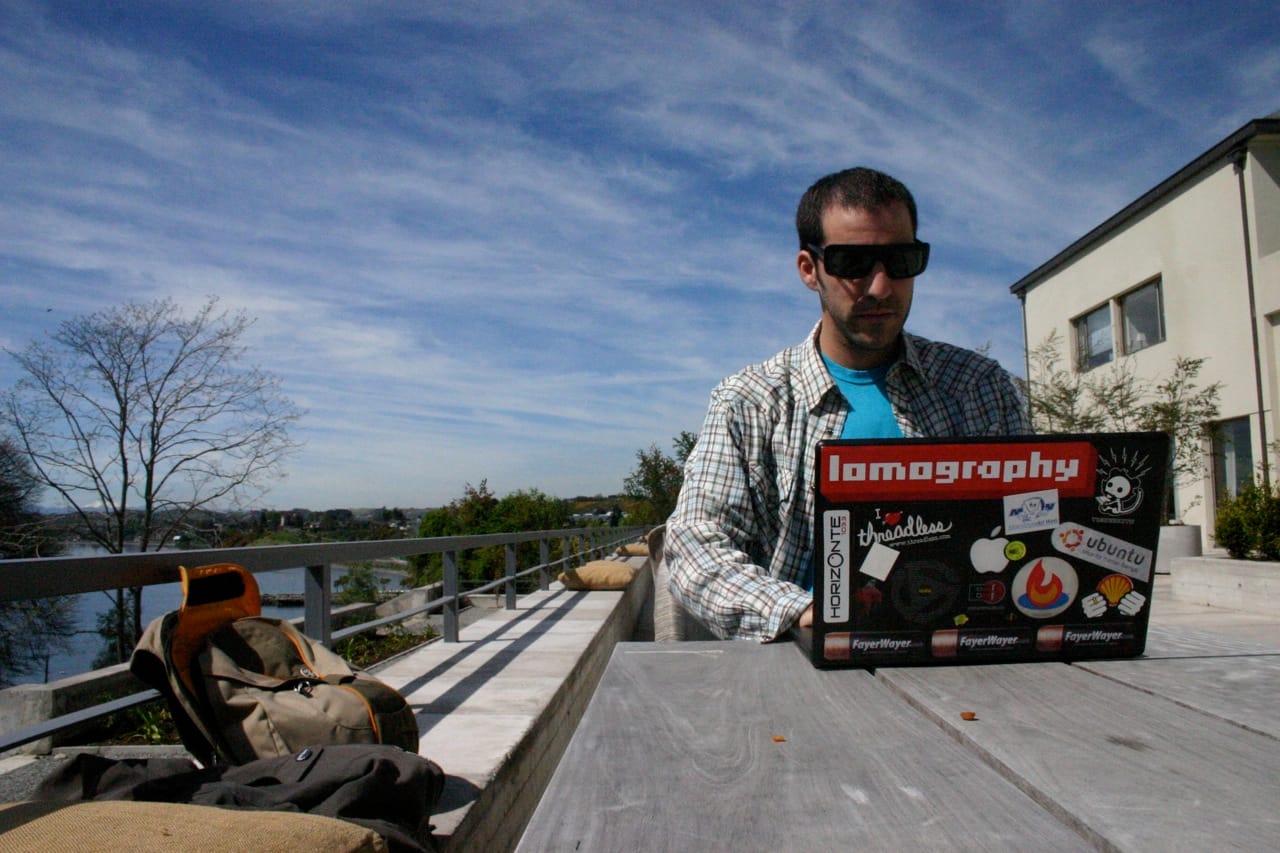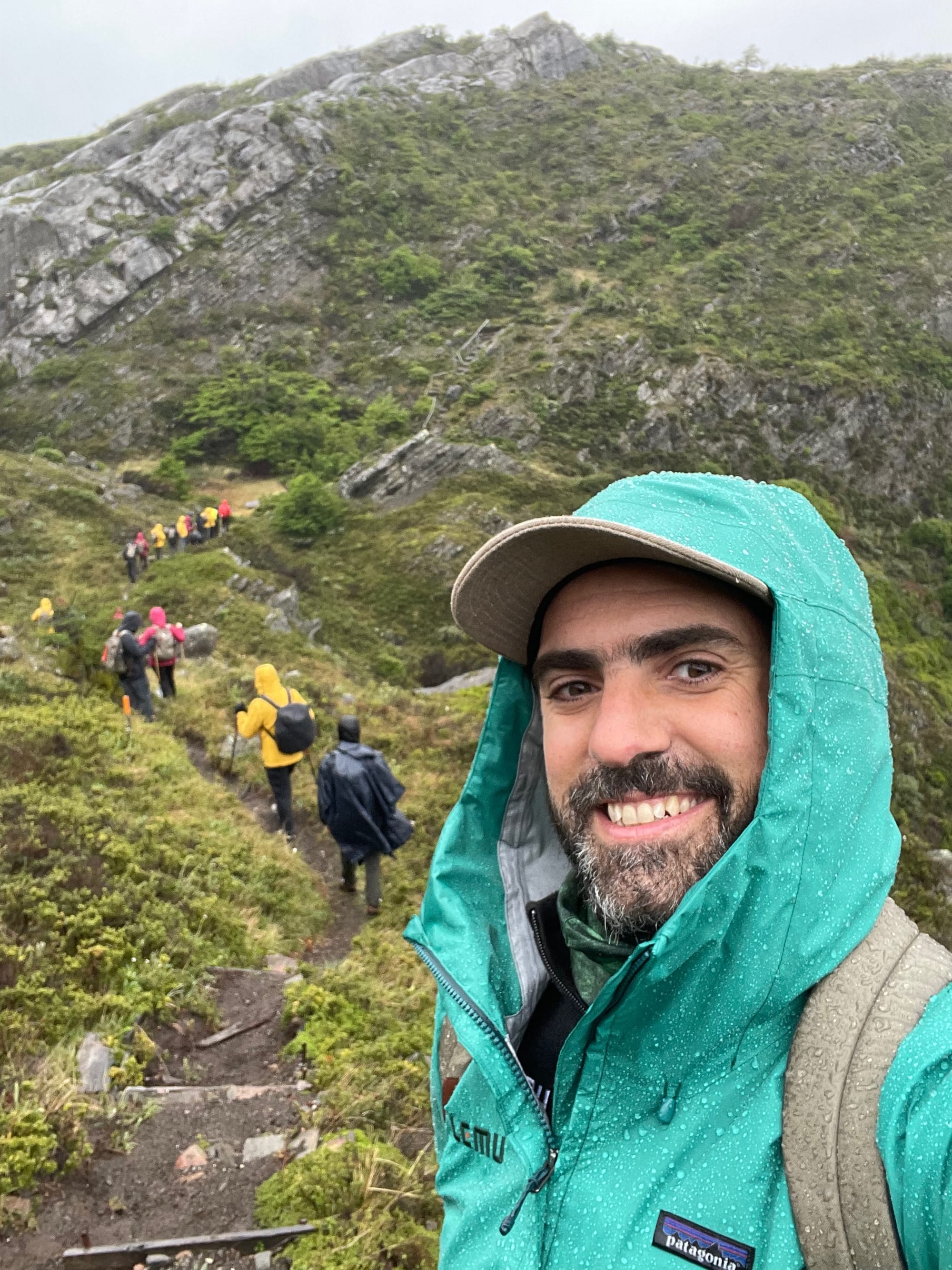The Prieto Vision for Chile: A potpourri of blogs, broadband and WiFi
This is a year old interview that was done by Santiago Times and I hadn't published yet. Now that I'm off to San Francisco in a week, I thought it might be interesting to post some english content.

(January 27, 2007)
“Sorry I’m late, you’re my ninth meeting today,” Leo Prieto apologizes as he enters Santiago’s Café de Las Artes. It is but 3:12 pm on a Wednesday. In a matter of seconds, the gawky 27-year-old web designer catches the waiter’s eye, slips past the women pinching macchiato demitasses, collapses into his chair, and does the next logical thing: orders a mango juice. As the poster child for Chile’s Web 2.0 generation, this is a perfectly classy request.
“I work right over there”—he booms in impeccable English, catching his breath—“But I’ve been all over the place today.”
For an internet technocrat whose start-up company Aardvark designs websites for Chile’s most prominent corporations, and whose current Zetacorp network receives millions of hits per month, Leo Prieto looks like a pretty darn average guy in his graffiti-logo gray t-shirt.
But then again, in the age of the second internet boom, dubbed “Web 2.0,” success stories often come as in the first, without suits, ties, polished shoes and short hair. A reporter who visited Steve Chen and Chad Hurley’s original YouTube office was stunned: “The YouTube office is a big messy loft that looks like a fantasy dorm,” he wrote. At Googleplex in Mountain View, Google employees can be spotted in bathing suits, taking advantage of the complementary outdoor wave pool.
Granted, Prieto may or may not be the next Steve Chen or Chad Hurley, but being named one of El Mercurio’s “100 Top Young Chilean Leaders” of 2006 allows him certain executive authority. Prieto requests videoconferences (in whatever clothes he desires, camera position pending) in lieu of face-to-face meetings. With a resume that includes traveling with former Chilean President Ricardo Lagos to Silicon Valley and three international awards, clients usually oblige.
Web 2.0 is a tale of young innovators keeping the big guys in check. Steve Jobs and Steve Wozniak debuted their catchy Apple Technology in 1976, muscling out the “Big Brothers” at IBM. A 30-year-old Bill Gates took the reins in 1985 with his Microsoft Windows. Then in 1996, Google’s young guns Larry Page and Sergey Brin stole center stage both at the tender age of 23. Their company posted over $7 billion dollars in revenue in 2006.
When asked how he would pitch his newest project, Zimio, to the Google boys—if the hypothetical situation were to arise—Prieto laughs, but quickly demurs. “Well, it’s not ready yet,” he says.
Google is a critic’s darling to some. To others it smells of a nefarious monopoly, one that swallows up small companies in its wake. Prieto is part of the former category.

“Today, I like Google and what they are doing. Because they are making other companies realize that there’s money there. When everyone else was losing faith in the industry, they were like, ‘look at us,’ our profit per quarter is around $700 million dollars. There’s a second boom thanks to Google.”
Prieto points to Google’s recent acquisition of video site YouTube for $1.65 billion as a leading example, claiming it stimulated innovation and hence opened up the market.
“After YouTube was sold, in that month, seven or eight of my close friends were like seriously, ‘Leo, give me an idea, I want to start a project.’”
Prieto is everyone’s go-to man for good reason. He launched his web design company Imagemaker at the ripe age of 20, doing web consulting for bigwig companies like BCI, Entel and Copec. Then at 25, he developed a blog addiction. Today, his tech-savvy blog Fayerwayer receives over a million hits per month, while his own personal blog, “Leo is News,” hogs more than its share of web traffic.
Add his socialite Nuyorker blog, Saborizante e-zine, Radio Isla Negra station and Zimio free classified ads project, and voila: meet his Zetacorp Network, supporting upward of forty employees. With all his blog success, it is almost too easy to overlook his “real” venture, Aardvark, which is his latest web application company that caters to Chilean mega-entrepreneurs.
Like many visionaries, Prieto prefers to chat about his upcoming projects. In 2007, he plans to launch Zimio’s social networking dimension, a warping of Craigslist and Myspace. Currently Zimio is only available in eight Chilean cities, but in 2007 Prieto plans to go global.
“When it’s launched it will be for all 225 countries and territories — I didn’t even know there were that many countries! It’s super clever. The moment you log in, it can detect where you are connecting from and activate that country in that moment.”
Prieto voice grows more intense; his sentences pick up speed. His excitement is contagious.
“It’s the same old Zimio, but you can collect friends. So you can see if your seller is a friend of a friend and therefore reliable. It’s amazing, but it’s not that impossible. We did it. We believe it is going to take off in Spain, Mexico, Argentina…and maybe in the Czech Republic, you know, there will only be three posts, but you’ll still be able to do it.”
His self-promotion is not in vain: he simply believes that social-networking Zimio is a better service than Craigslist. That is not to say he was not once a Craigslist fanatic. He discovered Craigslist in New York and quickly fell in love. So much so, he ditched his partners to launch Zimio, Craigslist’s Chilean doppelganger.
Yet his Craigslist critique is dead earnest. “It could be so much better. The design is so, so horrible. It’s very effective, but it could be so much simpler. They used to say they didn’t care about the looks. But now they are nine years old. They could do at least a little makeover. Or change the typography.”
He shakes his head solemnly, as if Craigslist were letting down its cyberspace fans. His irritation quickly tempers into a shrug, then a sly smile. Prieto is first to admit that the Craigslist novelty has staying power, with or without a makeover.

What Prieto cannot shake off with a shrug, however, is how, when it comes to equitable technological distribution in Chile, the Bachelet government is all talk and no action. Unlike most for-profit web designers, Prieto dedicates many working hours campaigning for affordable technology across income brackets. His current projects include support for the worldwide “One Laptop Per Child” (OLPC) initiative and his “Broadband for All” movement.
While President Michelle Bachelet smiles cordially before the cameras, proud to display the new laptops her government’s Enlaces program delivered to a grand total of four Chilean schools, Prieto blogs away about the OLPC, a global movement to disseminate affordable laptops to every child in the world.
“And you know what really pisses me off is how the government in Chile gloats, ‘We are the most technologically advanced country in Latin America and we are the leaders in technology with the highest computer penetration,’” he complains. “But when you look at all the details, it is not true. Yeah, there’s high computer penetration, but most schools still don’t have them.”
Prieto is all about long-term solutions. Together with members of Atina Chile, an activist movement promoting accessible technology, Prieto believes OLPC is the only viable solution to the technology gap. The OLPC is already underway in Uruguay and Brazil. However, the Chilean government has given the initiative the cold shoulder, even while Chilean classroom technology remains sub-par.
“Most schools and universities don’t have enough computers or computer classes, and what’s worse, they don’t have real internet. The speed they really need. It’s quite embarrassing.”
Which leads Prieto to his second biggest source of frustration: Chile’s poor distribution of broadband and limited wifi. Santiago’s business district offers the fastest internet in South America at 100 megabits per second. In the center of Chile’s bustling capital, speeds even surpass residential broadband speeds in New York.
“But twenty kilometers away you can’t even get internet!” Prieto exclaims, his bafflement almost beyond words.
He then turns on his favorite catchphrase: “Every Chilean should have the right to broadband.”
The conversation — or harangue, rather — is suddenly interrupted by his cellphone ring tone, the third one in an hour. It is exhausting being Leo Prieto. Before he snaps the cellphone shut he is already back on track, not having skipped a beat.
“What the government should do is push companies, provide them incentive — whether economical or not — but these companies should extend their broadband to other regions,” he drives his point home.
His passionate soliloquies are quite inspiring, made more so by the fact they are delivered in Prieto’s second language: fluent English. Born in Santiago, he spent most of his childhood in Spain, Thailand, Holland, Brazil, and Australia, finally returning to his homeland at 16. At 24 he moved to New York for six months, where he picked up a handful of clients and just the faintest Manhattan accent.
This may explain why his occasional lapse into “pero…” carries a whiff of The Big Apple. In reference to his failed T-shirt logo for the self-proclaimed “New Jew Review” Heeb Magazine, the accent grows a touch thicker. “Steven Spielberg, man, would have looked so cool with his Heeb t-shirt.”
Beneath all the social visions, blog networks, broadband campaigns and consulting companies, Prieto is still just a 27-year-old guy who writes electronic music when he has free time. And he is not entirely without a sense of humor on the subject of Chile and technology.
“Zimio is probably going to advertise through Google and El Mercurio online. It would be funny to infiltrate El Mercurio classified section with Zimio ads. They are so out of touch, they would never know.”
— By Kerry Fleisher, Santiago Times



